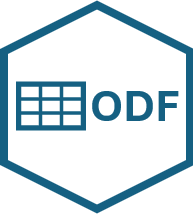 Stata
Package
Stata
Package
- Overview
- Installation
- Getting Started
- Additional Functions
- Multilingual Datasets
- Further Information
- Getting Help
Stata Package opendf
The opendf package is specifically designed to
facilitate the seamless utilization of the Open Data Format in Stata. It
offers functionality to import data from the Open Data Format into a
Stata data frame, as well as export data from a Stata data frame (.dta)
to the Open Data Format. Additionally, you can easily access
comprehensive information about the dataset and variables. This
user-friendly approach ensures convenient exploration and utilization of
dataset information within your preferred environment.
Installation
The Stata package can be installed from SSC using the command
ssc install.
* Install the package from ssc:
ssc install opendf
Alternatively the development version can be installed from GitHub.
* Install the development version from GitHub:
net install opendf, from (https://opendataformat.github.io/stata-package-opendf/) replace
Getting Started
The opendataformat package consists of three main functions:
opendf readto read an Open Data Format file in Stata. This function takes an input parameter, which is the path to the Open Data Format ZIP file.opendf docuto explore the dataset information. You can display metadata for the whole dataset usingopendf docuor an selected variableopendf docu variable.opendf writeto write the Stata data frame to an Open Data Format ZIP file. By specifying the dataframe input and providing the output directory path the function will generate a ZIP file containing the dataset stored in a “data.csv” and the metadata stored in a “metadata.xml”.
* You can load a dataset in opendf-format with opendf_read by specifying the path to the zip-folder, (in this case, the testdataset from github):
opendf read "https://opendataformat.github.io/stata-package-opendf/example_data/soep_data.zip", clear verbose
Additional Functions
The opendataformat package provides further functions that might be helpful:
opendf installpythonwill install a python version that enables the opendf-package to work. Some functions (opendf readandopendf write) need a working python version on your PC. If Stata is not able to find a working python version, you can use this command to copy a python (default v3.12) to the Stata ado/plus folder (where Stata packages are stored). You can also specify the python version you want to install and specify a location where the folder with the python version should be deployed. But than you have to tell Stata manually where the python.exe is located using “set python_exec”.opendf removepythonwill remove python versions installed withopendf installpython. By default the the command will delete all python3 folders/installations from the Stata ado folder (the default folder whereopendf installpythondeploys the python installation). With theversion()-option can also specify which python version to remove. With thelocation()-option you can indicate where to delete the python folders from.opendf_csv2dtato read data from four csvs containing data and metadata into Stata.opendf_csv2zipto save data from four csvs containing data and metadata to a opendf-format (zip-folder containing data.csv and metadata.xml). The csvs consist of data.csv (raw data), dataset.csv (dataset metadata), varaibles.csv (variables metadata) and categories.csv (value labels for variables).
For data providers the opendf_csv2dta and
opendf_csv2dta functions might be interesting to convert
their data to the opendf format.
Multilingual Datasets
When working with a multilingual dataset, the
opendataformat package provides the option to specify the
language you want to work with for the main functions:
opendf read, opendf docu,
opendf write.
You can achieve this by using the languages argument and
setting it to either all to include all languages, or by
specifying the language code such as de for German or
en for English. This allows you to easily select the
desired language for your dataset operations. Metadata without a
language tag will be assigned to the language default. The
language codes are defined by the ISO
639-1.
Further Information
For more comprehensive insights into the Open Data Format specification, read the Open Data Format Specification. This resource provides detailed documentation and profiles illustrating the storage locations of attributes within the Open Data Format, as well as within the native formats to which they will be converted.
Additionally, you can download a practical example of a data file in the Open Data Format (example_dataset.zip).